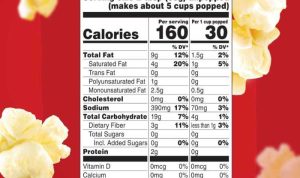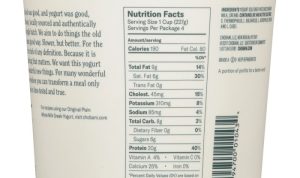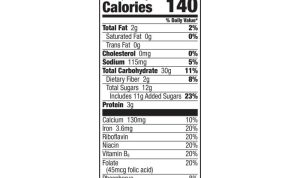Specific Nutrient Requirements for Individuals Wearing Body Armor: Body Armor Nutrition Facts
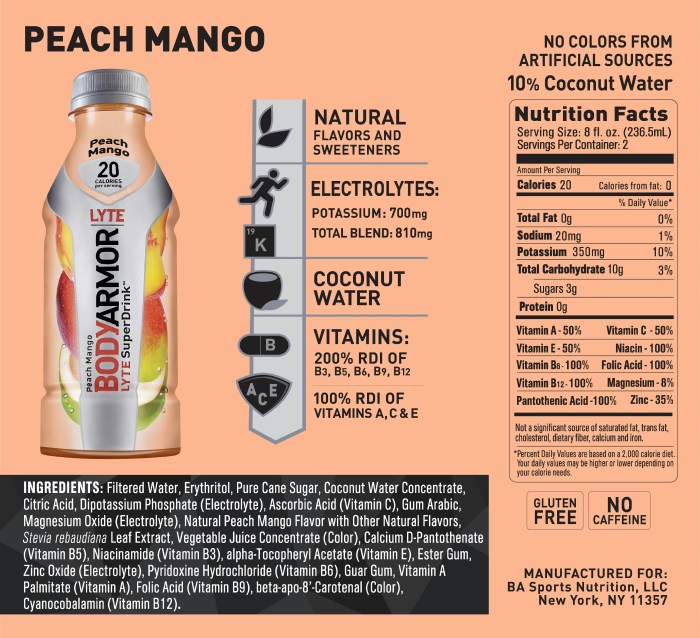
Body armor nutrition facts – Wearing body armor significantly impacts the physiological demands placed on the body, particularly during strenuous activities. The added weight and restricted movement increase energy expenditure and core temperature, resulting in heightened nutritional needs compared to individuals performing similar tasks without armor. Understanding these specific requirements is crucial for maintaining optimal performance, hydration, and overall well-being.The nutritional needs of individuals wearing body armor differ from those engaged in similar physical activities without armor primarily due to the increased metabolic demands.
The extra weight of the armor increases energy expenditure, requiring a higher caloric intake to compensate. Furthermore, the restricted movement and heat retention associated with body armor can lead to increased dehydration and electrolyte imbalances. This necessitates a more focused approach to hydration and electrolyte replenishment, as well as increased consumption of essential vitamins and minerals to support the body’s increased metabolic workload and repair processes.
The increased heat stress also necessitates a greater intake of fluids to maintain proper hydration and prevent overheating.
Electrolyte Requirements in Individuals Wearing Body Armor
Prolonged sweating, a common occurrence when wearing body armor, leads to significant electrolyte loss, particularly sodium and potassium. Sodium is vital for maintaining fluid balance and nerve and muscle function. Potassium plays a crucial role in muscle contractions and nerve impulses. Severe depletion of these electrolytes can result in muscle cramps, fatigue, weakness, and even heat exhaustion or heat stroke.
Therefore, individuals wearing body armor, especially during periods of intense physical activity, require increased sodium and potassium intake through dietary sources or electrolyte supplements. For example, a police officer on patrol in hot weather wearing full body armor would benefit from consuming electrolyte-rich sports drinks or incorporating foods like bananas and coconut water into their diet. This proactive approach to electrolyte replenishment is crucial for preventing performance degradation and maintaining overall health.
The Role of Antioxidants in Mitigating Oxidative Stress, Body armor nutrition facts
Physical exertion and heat stress, both exacerbated by wearing body armor, increase the production of reactive oxygen species (ROS), also known as free radicals. These unstable molecules can damage cells and tissues, contributing to oxidative stress. Oxidative stress is linked to various health problems, including muscle fatigue, inflammation, and impaired immune function. Antioxidants, found in fruits, vegetables, and certain supplements, help neutralize ROS, thereby protecting against oxidative stress.
Examples of antioxidant-rich foods include blueberries, spinach, and dark chocolate. Incorporating these foods into a regular diet can help mitigate the negative effects of oxidative stress associated with wearing body armor, ensuring that the body has the necessary tools to repair itself and prevent cellular damage from the increased physical strain and heat exposure. Studies have shown that supplementation with antioxidants, such as Vitamin C and E, can further enhance the body’s ability to combat oxidative stress, although individual needs and potential interactions with other medications should be considered.
Practical Strategies for Maintaining Optimal Nutrition While Wearing Body Armor
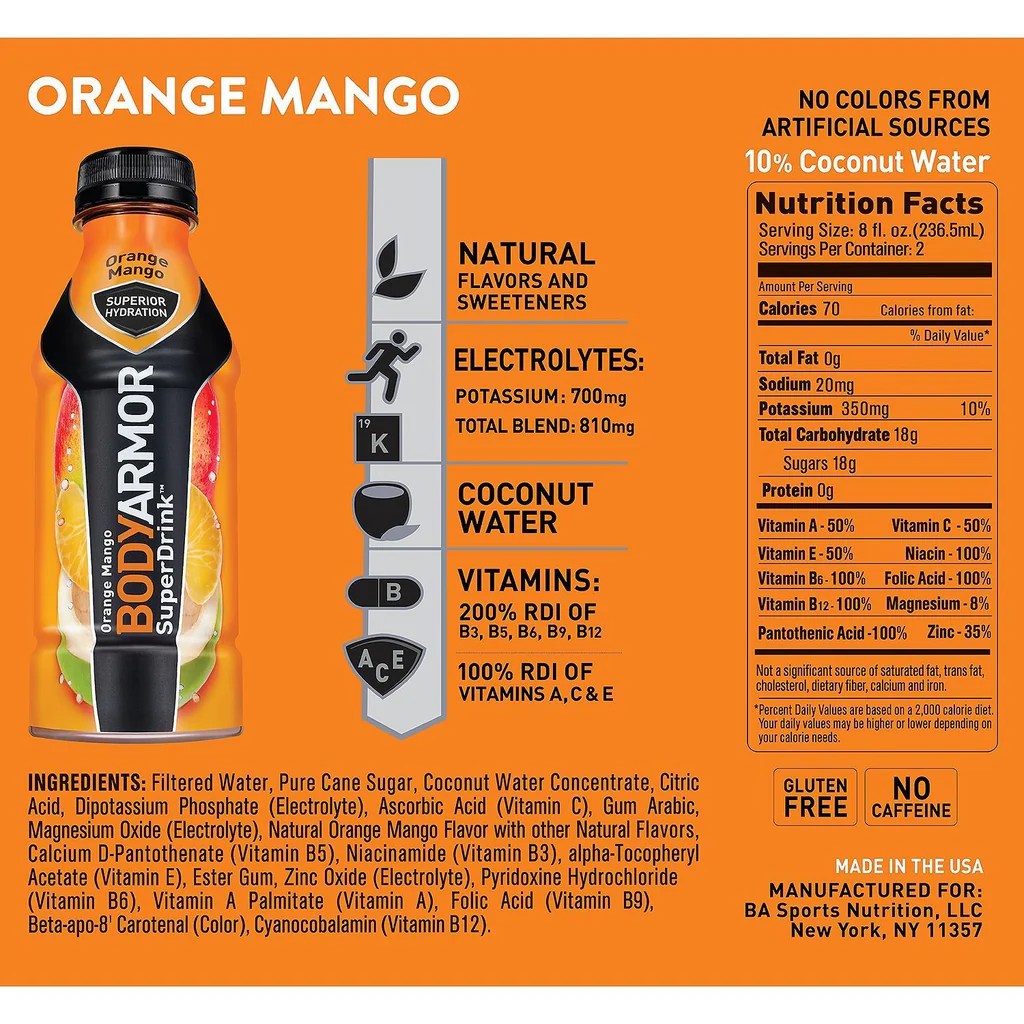
Maintaining optimal nutrition while wearing body armor presents unique challenges. The added weight and restricted movement can impact appetite, digestion, and access to food. However, with careful planning and strategic choices, individuals can effectively meet their increased nutritional needs and maintain energy levels throughout demanding activities. This section Artikels practical strategies for achieving this.
Understanding body armor nutrition facts requires considering the energy demands placed on the wearer. Optimal performance relies on a balanced diet, and a key component could be lean protein sources. For example, a detailed look at the nutrition facts of beef steak can help illustrate the protein and iron content beneficial for maintaining strength and endurance.
Ultimately, a comprehensive nutritional plan tailored to the individual’s needs is crucial for maintaining physical fitness while wearing body armor.
Meal Timing and Frequency
Proper meal timing is crucial for sustained energy and performance. Instead of three large meals, consider consuming smaller, more frequent meals and snacks throughout the day. This approach prevents blood sugar fluctuations and reduces the digestive burden, especially when physical activity is high. For example, a breakfast of oatmeal with berries and nuts, followed by a mid-morning snack of a protein bar, a light lunch, an afternoon snack of fruit and yogurt, and a balanced dinner can provide consistent energy.
The timing should be adjusted based on training or operational schedules, aiming for meals roughly 3-4 hours apart.
Snack Choices for Sustained Energy
Snacks should be carefully selected to provide readily available energy and essential nutrients. Opt for nutrient-dense options that are easy to consume and transport. Examples include trail mix (nuts, seeds, dried fruit), energy bars (check labels for added sugar), fruit (apples, bananas, oranges), jerky (lean protein source), and hard-boiled eggs. These choices offer a balance of carbohydrates, proteins, and healthy fats to support sustained energy and muscle recovery.
Avoid sugary snacks that lead to energy crashes.
Hydration Strategies
Adequate hydration is paramount, particularly when wearing body armor in hot or humid conditions. Dehydration can significantly impair physical performance and cognitive function. Carry a water bottle or hydration pack and sip water regularly throughout the day, even when not feeling thirsty. Consider electrolyte drinks during prolonged periods of intense activity to replace lost salts and minerals. Monitoring urine color can be a simple indicator of hydration status; pale yellow urine indicates adequate hydration.
Darker urine signals a need to increase fluid intake.
Preparing and Carrying Nutritious Meals and Snacks
Preparing meals and snacks in advance is key to ensuring consistent access to nutritious food. Consider using reusable containers to pack meals and snacks. Focus on foods that are non-perishable or require minimal refrigeration. For example, pre-cooked chicken or fish, whole-grain wraps, and individual servings of nuts and seeds can be easily transported and consumed in the field or during training.
Invest in a good quality insulated lunch bag or cooler to maintain food safety and temperature.
Incorporating Nutrient-Rich Foods into a Daily Diet
Despite the challenges, incorporating nutrient-rich foods is achievable. Prioritize lean protein sources (chicken, fish, beans, lentils) for muscle repair and growth. Include plenty of fruits and vegetables for vitamins, minerals, and antioxidants. Choose whole grains (brown rice, quinoa, oats) over refined grains for sustained energy. Healthy fats (avocado, nuts, seeds) are essential for hormone production and overall health.
Meal prepping and using convenient options like pre-cut vegetables or frozen fruits can save time and effort. Supplementing with a multivitamin can help ensure adequate intake of essential nutrients if dietary intake is consistently limited.
The Role of Supplements in Supporting Nutritional Needs
Wearing body armor significantly increases the physical demands placed on the body, potentially leading to heightened nutritional needs. While a balanced diet forms the cornerstone of meeting these demands, nutritional supplements can play a supporting role in addressing specific nutrient gaps or enhancing recovery. However, it’s crucial to approach supplementation strategically, considering both potential benefits and risks. Improper use can be detrimental to health, so consulting a healthcare professional or registered dietitian is highly recommended before starting any supplement regimen.Supplementation should be viewed as a complementary strategy, not a replacement for a healthy, well-balanced diet rich in fruits, vegetables, lean proteins, and whole grains.
The goal is to optimize existing nutritional intake, not to rely solely on supplements for nutritional needs.
Benefits and Risks of Nutritional Supplements for Body Armor Wearers
Nutritional supplements offer the potential to address specific nutrient deficiencies or enhance recovery processes, particularly beneficial for individuals facing the increased physical demands associated with body armor. However, potential risks exist, including interactions with medications, adverse effects, and the possibility of consuming excessive amounts of certain nutrients. It’s essential to choose high-quality supplements from reputable manufacturers and to follow recommended dosages carefully.
Unverified or poorly manufactured supplements may contain contaminants or inaccurate amounts of listed ingredients.
Examples of Beneficial Supplements
Certain supplements may be particularly beneficial for individuals wearing body armor, assisting in muscle recovery, electrolyte balance, and overall energy levels. However, individual needs vary greatly, and the effectiveness of any supplement depends on several factors, including overall diet, activity level, and individual metabolism.
- Creatine: Creatine monohydrate is a naturally occurring compound that aids in increasing muscle strength and power output. This can be especially beneficial for those performing strenuous tasks while wearing body armor, potentially reducing fatigue and improving performance. However, some individuals experience gastrointestinal discomfort with creatine supplementation.
- Protein Powder: Protein is crucial for muscle repair and growth. Protein powder can be a convenient way to increase daily protein intake, especially helpful after intense physical activity while wearing body armor. Whey protein, casein protein, and soy protein are common options, each with slightly different absorption rates and benefits. Choosing a protein source that aligns with individual dietary needs and preferences is important.
- Electrolyte Supplements: Prolonged periods of physical activity while wearing body armor can lead to significant fluid and electrolyte loss through sweat. Replenishing electrolytes, such as sodium, potassium, magnesium, and calcium, is crucial for maintaining hydration, preventing muscle cramps, and supporting optimal bodily functions. Electrolyte drinks or tablets can be particularly beneficial during and after intense periods of activity.
Safe Supplement Usage and Potential Drug Interactions
Safe supplement usage involves careful consideration of dosage, quality, and potential interactions with medications. Always choose supplements from reputable manufacturers that have undergone third-party testing to verify purity and label accuracy. It is essential to follow the recommended dosage on the product label and to consult with a healthcare professional or registered dietitian before starting any supplement regimen, especially if you are taking other medications.
Some supplements can interact negatively with certain medications, leading to unwanted side effects or reduced effectiveness. For example, some supplements can interfere with blood thinners or medications used to treat heart conditions. A healthcare professional can help assess potential interactions and ensure safe and effective supplementation.
Question & Answer Hub
What are the best snacks for someone wearing body armor?
High-protein, easily digestible snacks like trail mix (nuts, seeds, dried fruit), energy bars, or jerky are ideal. They provide sustained energy and are easy to carry.
Can dehydration lead to serious problems when wearing body armor?
Yes, severe dehydration can lead to heat exhaustion, heat stroke, and decreased performance. Consistent hydration is crucial.
How often should I eat while wearing body armor?
Frequent, smaller meals (every 2-3 hours) are preferable to prevent energy crashes. This supports sustained energy levels throughout the day.
Are there specific vitamins or minerals I should focus on?
Electrolytes (sodium, potassium), Vitamin D, and antioxidants are particularly important due to increased sweating and oxidative stress.
What are the risks of overusing supplements?
Overuse can lead to imbalances, interactions with medications, and potential health problems. Consult a healthcare professional before starting any supplement regimen.

